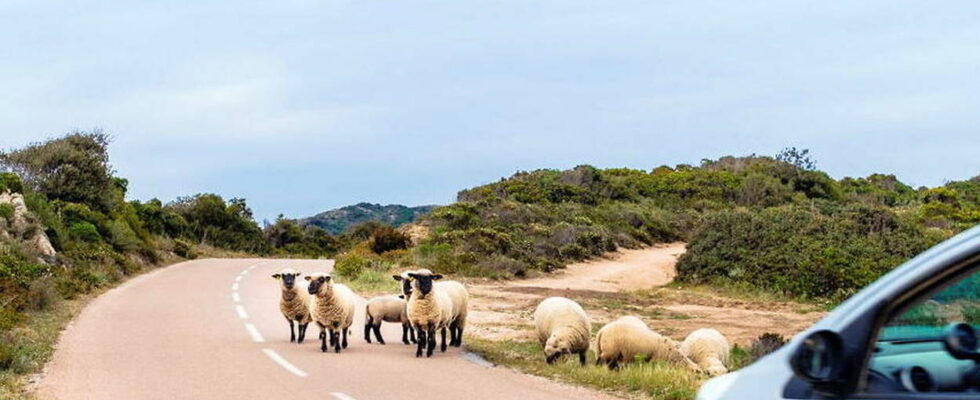The island is the unsuspected Eldorado of the electric car. Registrations are up sharply and the region is number one in France. Explanations.
From our correspondent in Bastia, Julian Mattei
© JEAN-BAPTISTE PREMAT / Hans Lucas via AFP
Published on
Subscriber-only audio playback
I’The rise of electric cars goes through… Corsica. One figure would suffice to illustrate this: 47%. This is the growth in registrations of private electric vehicles on the island in 2022, compared to 26% on the national territory. “It’s a booming market, observes Hervé Bastanti, sales manager at the Peugeot dealership in Biguglia (Haute-Corse). This segment represents approximately 20% of our transactions. Despite a purchase cost that remains high, there is momentum. »
This automotive professional is not the only one to make this observation. Although the island has lagged behind in this sector in recent years, the trend has been clearly on the rise for several months. Figures from the data and statistical studies department of the Ministry for Ecological Transition bear witness to this: with a car fleet of around 5,500 electric cars at the end of 2022, the island has 16 “clean” vehicles for 1,000 inhabitants, compared to 9 for the national average. In other words, a leading position in the electric car segment, leaving the Provence-Alpes-Côte d’Azur region (12) in second place in the rearview mirror.
READ ALSOElectric car: charging stations on trialAt BMW, the increase in sales is enough to describe the scale of the phenomenon: + 172% in 2022 in the car dealerships of the manufacturer in Corsica. “Even if we remain, for the time being, on small volumes, we are seeing a significant increase, explains Christophe Yvrande, director of SAS Bernardini, dealer for the Mini and BMW brands on the island. Last year, electric represented 10% of our sales, against 7.6% on average for our manufacturers in France. »
The elevation, an advantage
This growth owes nothing to chance. Industry professionals give several reasons for this. Starting with fuel prices: despite a lower level of taxes supposed to erase the additional costs linked to insularity, with a derogatory VAT of 13% – compared to 20% on the mainland -, the Corsicans pay more than on the other side of the Mediterranean. In an opinion made public in 2020, the Autorité de la concurrence had highlighted a “very significant” differential: on average + 6.7% for diesel and + 5.3% for SP 95. The increases in the last months, a fortiori on an island where the car is a daily companion with a travel budget higher than a third of the national average, according to INSEE, have undoubtedly greatly contributed to these conversions to electric.
READ ALSOFuel prices: why Corsica misses the cap
Just like the diversification of the offer, the ecological bonuses of the State and the tax incentives which largely helped to start the market throughout France. “Because of the narrowness of its territory [183 kilomètres de long du nord au sud et 83 kilomètres dans sa plus grande largeur, NDLR], Corsica is a region conducive to the use of these vehicles, advances Hervé Bastanti. The autonomy of the new electric models is sufficient for daily travel, without the need to recharge on the way, and the unevenness of the roads also favors the regenerative system to preserve the batteries. The consumption of Corsican motorists is not enough, however, to explain the rapid start of this market. Far from there.
The weight of renters drives up the statistics
This leading position owes a lot to the policy of rental agencies; a sector whose weight in Corsica is without common measure with the other regions, with regard to the tourist activity, the insularity and the weakness of the transport networks. This particularity weighs heavily in the statistics: of the 2,390 electric models registered on the island in 2022, more than a thousand were acquired by rental companies. Within the Hertz agency, these cars represent, for example, more than 40% of the fleet. “For three years, we have been offering more and more carbon-free vehicles, well beyond what the law requires us to do,” says Gilles Filippi, director of the company Filippi-Auto, representative of this brand on the island. The lack of charging stations has long been a brake on the start of electric in Corsica. This is no longer the case today. We have also invested heavily to strengthen the network, which has reassured customers about the fear of failure. »
Two years ago, Corsica was indeed the least well-endowed region in France, to the point of disillusioning some tourists on the holiday route, tired of tracking down insufficiently numerous charging stations. Since then, things have changed: via its subsidiary E-motum, the company Filippi-Auto has invested 2 million euros to install 240 fast charging points across the island and support the transition to electric. In addition, there are some 170 public terminals referenced on the chargemap.com site. If the network has become considerably denser, as on the scale of France which has just crossed the symbolic bar of 100,000 charging points open to the public, the deployment remains however below the objectives set by the island political power. The multi-annual energy program, approved in 2015 by the Assembly of Corsica, provided for the creation of 700 public charging stations in 2023.
READ ALSO100,000 charging stations: can we finally drive electric without fear?
